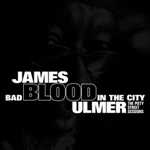|
|
 |
Dusted Reviews
Artist: James Blood Ulmer Album: Bad Blood In The City: The Piety Street Sessions Label: Hyena Review date: Apr. 19, 2007 |

|
|
|
 |
Since he reinvented himself at the turn of the millennium as a born-again bluesman, James Blood Ulmer has gone from strength to strength, culminating in the extraordinary stripped-down solo album Birthright in 2005, perhaps the blues album of the decade so far – pure, raw emotion, fuelled by Ulmer’s deep, rich voice. It seemed that it would be impossible to top it and, thankfully, Ulmer hasn’t tried. Instead, for this new release, he has returned to the winning formula of his previous two albums: his tight seven-piece group playing electric rhythm ’n’ blues.
The particular impetus to record this album was Ulmer’s reaction to Hurricane Katrina and the Bush administration’s response to it. Ulmer wrote a bunch of songs while watching events in New Orleans unfold on CNN, previewed them soon after, and now they form the backbone of Bad Blood In The City. The opener, “Survivors of the Hurricane,” sets the scene succinctly and ties together what follows. The playing is taut and together - evidence of their time spent in the studio and on the road - with producer Vernon Reid’s guitar particularly potent.
The funereal march of “Katrina” – in which Ulmer personalizes the disaster, making it sound like the work of a vindictive woman – features one of Ulmer’s more over-the-top vocal performances. His voice shakes and quivers with emotion as he recounts the events, closing with repetitions of the terse phrase, “Talk to the President,” venomously spat out. In contrast, “Let’s Talk About Jesus” is far more joyous and upbeat; if the title and lyrics weren’t sufficient, Irene Datcher’s sanctified backing vocals and Leon Gruenbaum’s organ leave no doubt about its origins. “There Is Power In The Blues” is short, punchy and lives up to its title, while “Old Slave Master” is largely a showcase for the band’s instrumental skills. Charlie Burnham’s fiddle – unusual in an electric band – and Ulmer’s own extraordinarily brutal guitar steal the track.
In addition to these five original compositions, the band gives barnstorming renditions of six blues classics, all of which fit the overall mood and narrative of the album. On Junior Kimbrough’s “Sad Days, Lonely Nights,” the wailing harmonica of David Barnes plays a repeated riff, relentlessly driving the song forward. Meanwhile, on Willie Dixon’s “Dead Presidents” and Howlin’ Wolf’s “Commit A Crime,” one is transported back to Chicago and Chess by the gruff power of Ulmer’s vocals – more than once reminiscent of Wolf himself.
These days, I’m not a great lover of new blues. Most of it's way too derivative and formulaic for me. But there's always an exception to the rule, and in this case, his name is James Blood Ulmer.
By John Eyles
|







